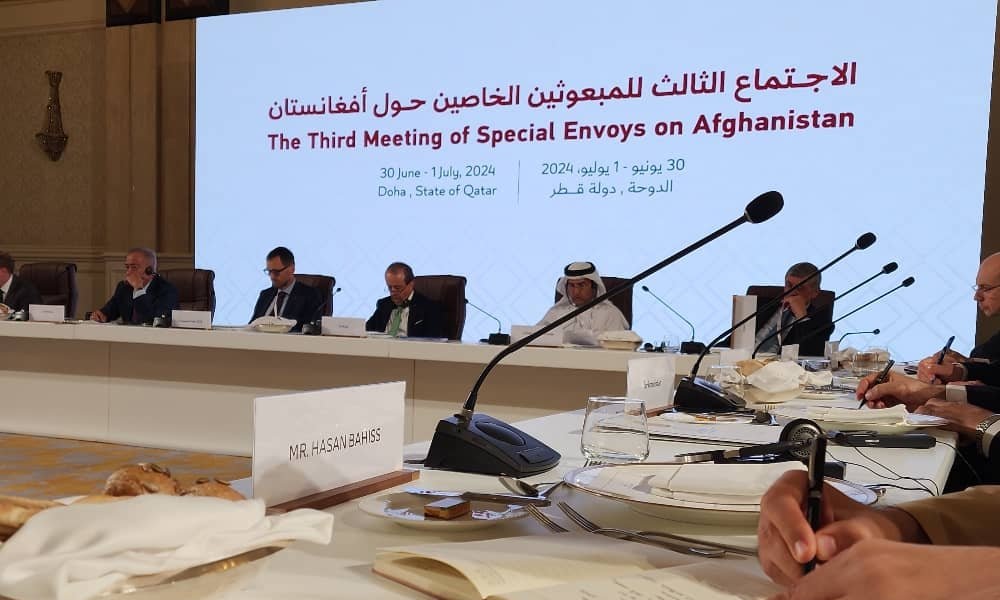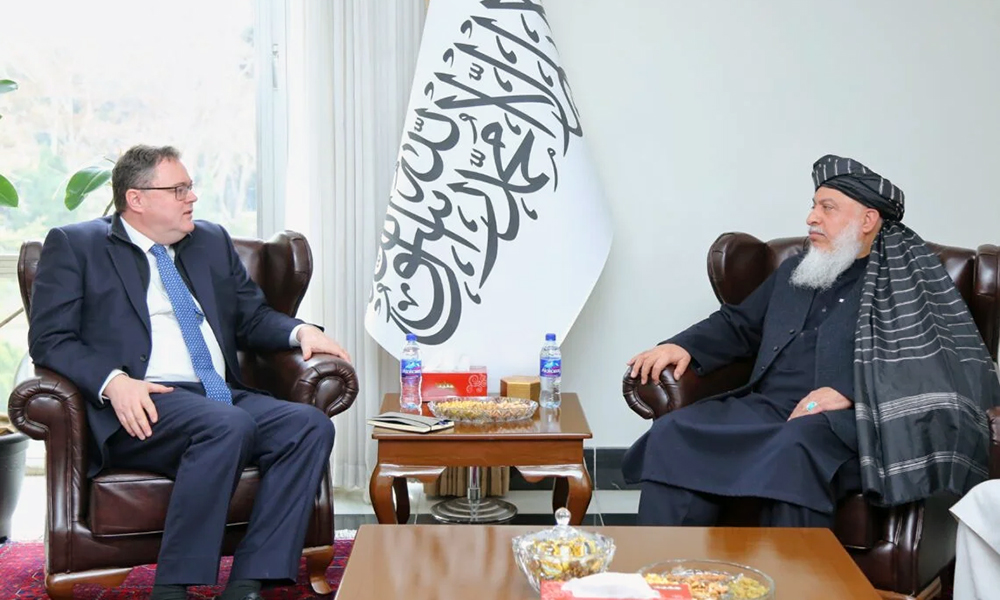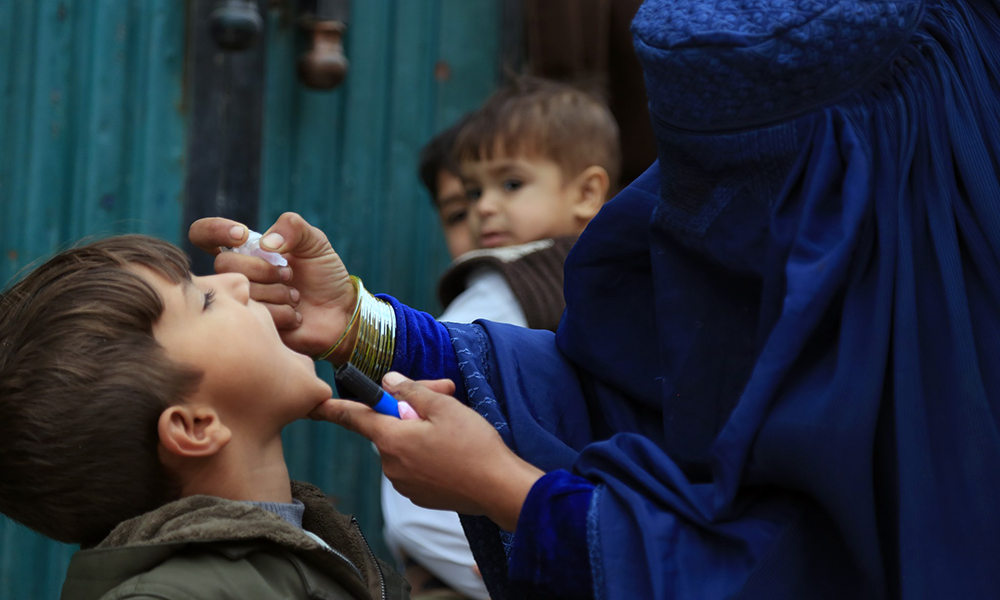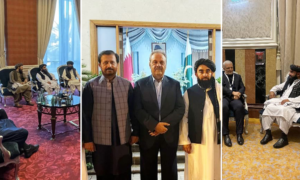Latest News
UN downplays absence of special envoys at meeting with Afghan women, civil society in Doha
Afghan women and civil society representatives had been barred from the formal two-day meeting, which included a delegation from the Islamic Emirate of Afghanistan (IEA).

The United Nations spokesperson for the secretary-general Stéphane Dujarric has downplayed the absence of many special envoys at their meeting with Afghan civil society representatives in Doha on Tuesday.
Dujarric said the UN is not in a position to tell country representatives which meeting to attend.
This comes after the UN Under-Secretary General Rosemary DiCarlo met separately with civil society members on Tuesday after the two-day special envoys meeting on Afghanistan in Doha wrapped up Monday.
Afghan women and civil society representatives had been barred from the formal two-day meeting, which included a delegation from the Islamic Emirate of Afghanistan (IEA).
Dujarric also stated the third Doha meeting had not been an intra-Afghan meeting.
The exclusion of women and civil society representatives from the formal meeting had become a topic of debate over the past few days with critics lashing out at the UN for not having demanded clear and measurable steps toward the restoration and protection of women’s rights as a crucial initial step toward engagement.
The Diplomat reports that instead, UN leadership has shown it is prepared to treat the fundamental human rights of half of Afghanistan’s population as a mere afterthought.
Dujarric meanwhile said that each special envoy could talk about human rights, women's rights and the issue of drugs.
He added that DiCarlo and Roza Otunbayeva, head of UNAMA, had raised the issue of women in the formal meeting and in their previous meetings in Kabul with the Islamic Emirate.
Dujarric emphasized that the issue of women and human rights is something that the United Nations deals with every day and is at the top of all the discussions of this organization.
On Tuesday, DiCarlo said at a press conference that there “really is a need to build trust on all sides”.
She said it was important to have dialogue “that’s built on honesty”.
“It’s got to be based on principles, those of the UN Charter, and various human rights treaties that Afghanistan is a party to.”
She also stated: “Human rights and especially the rights of women and girls , and inclusion of all members of society will continue to be an integral part of our discussions.”
Related Stories:
Mujahid sums up Doha meeting, says most countries willing to cooperate with Afghanistan
IEA delegation meet envoys from regional countries on sidelines of Doha meeting
Latest News
Eight Afghan migrants die as boat capsizes off Greek island

Eight Afghan migrants died after a speedboat carrying migrants capsized off Greece's eastern island of Rhodes on Friday, the Associated Press reported.
Greek authorities said that the capsizing was the result of the boat’s maneuvering to evade a patrol vessel.
A total of 18 migrants — 12 men, three women and three minors — all Afghan nationals, were rescued, Greece's coast guard said Saturday. The dead were also from Afghanistan, it said.
Some migrants remained hospitalized, with one in critical condition, authorities said.
Two Turkish citizens, ages 23 and 19, were arrested as the suspected traffickers. The boat sank after capsizing, the coast guard said.
The sinking off Rhodes was the second deadly incident involving migrants in the past week.
Seven migrants were killed and dozens were believed missing after a boat partially sank south of the island of Crete over the weekend — one of four rescue operations during which more than 200 migrants were rescued.
Latest News
Norwegian Chargé d’Affaires meets with IEA deputy foreign minister
Welcoming the diplomat’s visit to Kabul, Stanikzai underscored the importance of political relations between Afghanistan and Norway, the foreign ministry said in a statement.

The Norwegian Chargé d’Affaires for Afghanistan, Per Albert Ilsaas, on Saturday met with IEA’s Deputy Foreign Minister for Political Affairs, Sher Muhammad Abbas Stanikzai, in Kabul.
Welcoming the diplomat’s visit to Kabul, Stanikzai underscored the importance of political relations between Afghanistan and Norway, the foreign ministry said in a statement.
In addition to focusing on bilateral political, humanitarian, and other pertinent issues, the two sides expressed hope that continued engagement would lead to constructive solutions to related issues.
This comes two weeks after the Foreign Ministry Spokesman Abdul Qahar Balkhi expressed disappointment regarding the decision by the Norwegian government to downgrade diplomatic relations with Afghanistan.
Balkhi said in a post on X that such decisions should not be linked with internal affairs of other countries.
“Diplomatic engagement is most effective when it fosters mutual understanding and respect, even amidst differing viewpoints,” he stated.
“Access to consular services is a fundamental right of all nationals. We strongly urge all parties to prioritize this principle in the spirit of international cooperation,” he added.
Latest News
A new polio vaccination campaign is set to launch in Afghanistan
Afghanistan and Pakistan are the only two countries in the world where polio has not been eradicated.

The “Afghanistan Polio-Free” organization announced that a new round of polio vaccinations will begin on Monday, December 23, in various provinces of Afghanistan.
The organization did not specify which provinces will be targeted or how long the vaccination campaign will last.
Afghanistan and Pakistan are the only two countries in the world where polio has not been eradicated.
On December 4, 2023, the World Health Organization (WHO) issued a statement reporting a 283% increase in polio cases in Afghanistan. According to the WHO, the number of positive environmental samples for wild poliovirus type 1 in Afghanistan in 2024 reached 84, compared to 62 cases in 2023.
The Ministry of Public Health claimed in November 2024 that no new cases of polio had been reported in Afghanistan for the year.
-

 Latest News5 days ago
Latest News5 days agoIndia hoping to import coal and marble from Afghanistan
-

 Sport4 days ago
Sport4 days agoZimbabwe’s opening ODI against Afghanistan abandoned
-

 World3 days ago
World3 days agoNorth Korean troops suffer 100 deaths, struggling in drone warfare, South Korea says
-

 Latest News3 days ago
Latest News3 days agoTwo horror accidents on Kabul-Kandahar highway leave 52 dead
-

 Latest News1 day ago
Latest News1 day agoAfghan men must stand with women to support viable future of country: US envoy
-

 International Sports4 days ago
International Sports4 days agoLanka T10: Kandy Bolts in at 4th spot in playoffs after thrilling day
-

 Sport3 days ago
Sport3 days agoAfghanistan crush Zimbabwe by 232 runs in second ODI
-

 Regional4 days ago
Regional4 days agoIran’s president to make rare visit to Egypt for D-8 summit


























